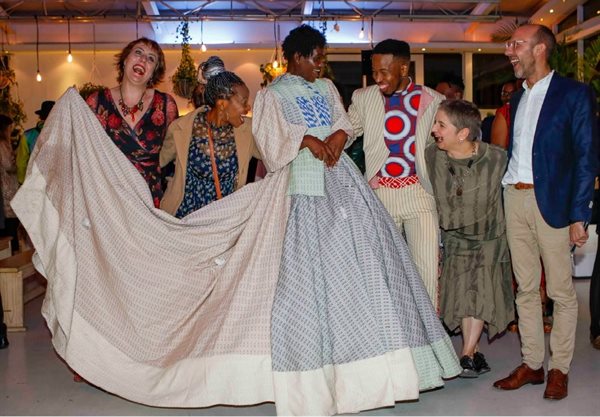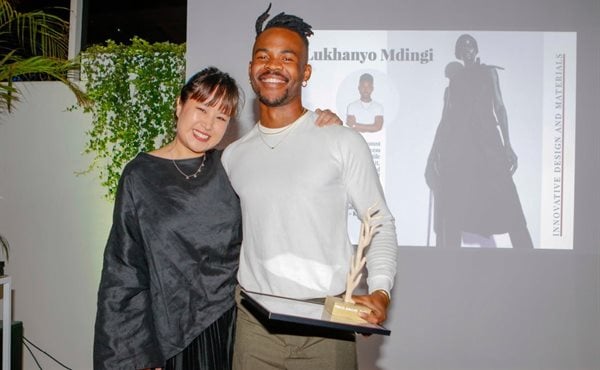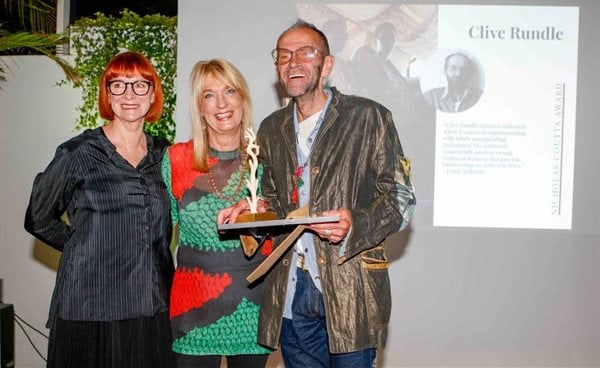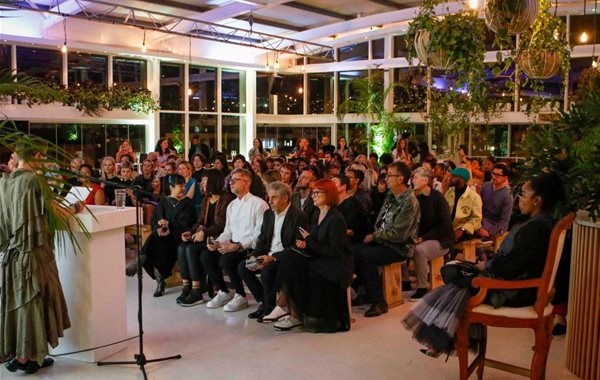Twyg, a not-for-profit organisation and online publication, created the awards to increase awareness around sustainable and ethical fashion and showcase the impact that eco-concious fashion and textile designers, and retail brands are having on the industry.
“We straddle the space between environmental activism and the fashion world to offer support and to communicate best fashion practices from around the world and best South African fashion practices to the world. There is an urgent need for a deep transformation of how we live and how we do business," Jackie May, founder and editor of Twyg, said in her address during the awards ceremony.
Facilitating industry transformation
Twyg is working with organisations like World Wide Fund for Nature, Fashion Revolution, The Southern African Clothing and Textile Workers’ Union, The African Fashion Research Institute and SA Fashion Week to further its work of facilitating the transformation of the industry.
SACTWU says the South African clothing and textile industry’s future growth path has to be based on sustainability, both in terms of our environmental impact and how workers are paid and treated. Twyg’s mission is to gather resources, disseminate research and make this accessible to designers, while its storytelling platform guides consumers in responsible lifestyle choices.
A model in a striking dress designed by Mzukise Mbane of Imprint ZA circled the floor at the awards ceremony. Sponsored by Cotton SA, it showcased a 100% South African value chain: the cotton was grown in South African, woven by SvenMill in Cape Town, and the textile was designed by Lesego Maloka of Pone Creatives.

Tanya Aucamp of Cotton SA, Lesego Maloka of Pone Creates, model Julia Francisco, Mzukisi Mbane of Imprint ZA, Jackie May of Twyg, and Brent Goldblatt of SvenMill.
Judging panel
The Twyg Awards judging panel included representation from education, fashion activism, styling, editorial, retail and conservation.
The judges were:
• Dr Desiree Small, senior lecturer in the department of fashion design at the University of Johannesburg.
• Cyril Naicker, CEO of Imprint Luxury, country coordinator of Fashion Revolution South Africa and qualified fashion designer.
• Kelly Fung, content director of Superbalist.
• Fezile Mdletshe-Mkhize, PhD candidate, lecturer at Durban University of Technology and founder of Fezile Fashion Schools Academy.
• Aaniyah Omardien, director at The Beach Co-op.
All submissions were judged according to specific criteria for each category. With the exception of the Student Award, all winners had to have been in business for at least one year and they had to be able to demonstrate ethical labour practices and transparency in practices and sourcing.
And the 2019 Twyg Awards winners are...
Changemaker Award: Amanda Laird Cherry
This award recognises a designer whose career has embraced sustainable and circular design practices. The recipient’s collections will have helped raise awareness of environmental and social issues. Criteria include choice of fabric, ethical labour practices, the extent of upcycling, the reduction of waste, and the use of non-toxic dyes. This designer demonstrates a commitment to promoting slow consumer fashion habits.
“The team at Amanda Laird Cherry has actively sought to make significant changes in their manufacturing process to ensure textile waste is minimised. From clever upcycling to choosing to use locally made fabric, each step in their process demonstrates a considered and consistent commitment to ethical fashion practices, without ever compromising on the dynamic aesthetic of their collections,” said Kelly Fung.

Twyg's Jackie May with Zwelisha Giampietri of Amanda Laird Cherry, winner of the Changemaker Award.
Retail Award: The Ethical Market
This award recognises a retailer or a retailing initiative that enhances sustainability, including pre-loved/gently worn, “swop shops”, garment rental and similar activities. The award was also open to retailers who support local producers, and sustainable design and manufacturing.
“The Ethical Market is a gentle, slow approach to retail,” said May. Judge Desiree Small added, “We need more of these.”
Innovative Design and Materials Award: Lukhanyo Mdingi
This award seeks to recognise a designer who uses techniques that minimise textile waste through innovative pattern cutting, the use of pre- and post-consumer fabric waste, and/or reconstruction techniques. The award also seeks to recognise a commitment to using sustainable fabrics in a collection.
“Lukhanyo takes into account every detail of the process from the source of textile to the hands that create it, leading to a cleverly designed garment that the wearer will want to use for a lifetime. He captures the meaning of modern luxury while navigating the path to a sustainable future,” said Kelly Fung.

Kelly Fung with Lukhanyo Mdingi, winner of the Innovative Design and Materials Award.
Student award: Katekani Moreku
This award goes to a student who has produced a garment or collection that addresses the challenges of sustainability in fashion in the most innovative, beautiful and practical way.
“Katekani Moreku is testament to what is possible in slow fashion. I was really happy to see this collection as it is proof that you can design something ‘new’ from re-used items. It takes a conscious designer to see this opportunity,” said Cyril Naicker.
Nicholas Coutts Award: Clive Rundle
This award recognises a designer who uses artisanal craft techniques such as weaving, embroidering or botanical dying to make fashion that foregrounds, celebrates and values the skills of the person who makes the garment.
“Clive Rundle remains unbeaten when it comes to experimenting with fabric manipulating techniques! His garments consistently possess strong technical features that give his handwriting an authentic DNA,” said Fezile Mdletshe.

CEO of SA Fashion Week Lucilla Booyzen, Nicholas Coutts’s mother Lindsay Coutts, and winner of the Nicholas Coutts Award, Clive Rundle.
Sustainable Accessory Award: Sealand Gear
This award recognises an accessory or accessory brand which implements ethical labour practices, limits toxic chemicals and uses sustainable materials to create a quality item and considers end-of-life. Ideally, it should be made of compostable materials, but, if not, it should be made using recyclable or recycled materials.
“Sustainability has been embedded as a core brand value long before this became fashion. Not only are Sealand accessories upcycled and re-cycled, they are fashionable, they look great, are made well and are good for the environment,” said Cyril Naicker.
Trans-seasonal Award: Sindiso Khumalo
This award recognises a collection, brand or designer who promotes trans-seasonal and versatile style. It rewards quality garments whose design aspires to be timeless and which are made to last. This category also recognises brands that remain invested in garments after their sale, for example, through the provision of lifetime guarantees or repair services.
“Sindiso Khumalo has a strength in keeping staple silhouettes that are renewed through fresh botanical geometrics, colours and prints. With her clean handwriting and choice of fabrication, her garments are able to travel from season to season making them exceptionally timeless. That’s her winning formula,” said Fezile Mdletshe-Mkhize.
Sponsored by PETCO
PET plastic recycling company, PETCO, the was the headline sponsor of the Twyg Awards.
PETCO’s Janine Osborne said, “PETCO is proud to be the sponsor for the inaugural Sustainable Fashion Awards. We believe that, if we are to see any major changes towards a sustainable future for all South Africans, our attitudes towards both the fashion and the food we consume needs to change. It’s through initiatives like the Sustainable Fashion Awards that these critical conversations can take place and meaningful change is perpetuated.”
Click here to view the list of finalists.









































